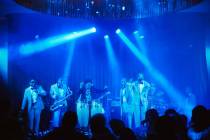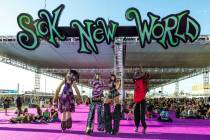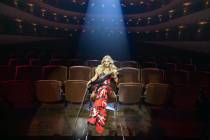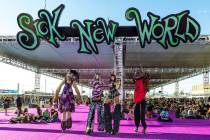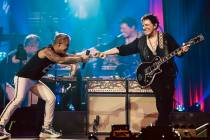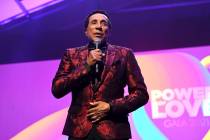Drake makes hip-hop act seem effortless

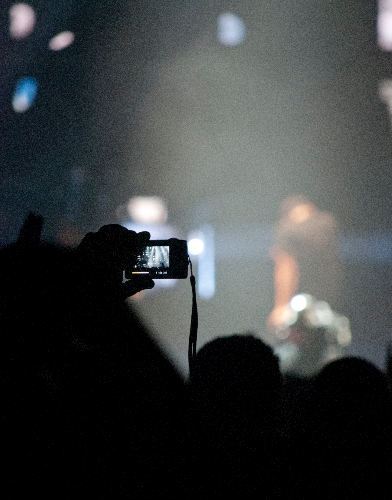
First, there were the expected come-ons from the handsome rapper who’s colonized enough hearts to form a kingdom that the sun never sets on.
“You got kids?” Drake asked a comely audience member Friday at the MGM Grand Garden. “You want another one?”
Shortly thereafter, he spotted a buxom blonde in the front row and anointed her his future wife.
She jiggled with pride, while many of the other ladies in the house craned their necks to assess the competition, radiating envy and perfume.
But then, as Drake walked from one side of the stage to the next, giving a shout-out to every section in the venue toward the end of his 90-minute set, he spotted a couple holding hands.
He seemed genuinely touched.
“I love that,” he smiled affectionately. “If you haven’t sealed the deal yet, tonight might be the night.”
And that’s Drake: the Lothario with a soft side, a member of the hip-hop elite who fancies himself a populist, a proud patrician with a plebian background.
Yes, there are plenty of obvious contradictions when inhabiting all those different roles, many of which seem to be at cross-purposes with one another, especially when it comes to Drake’s relationship with his sizable, highly vocal female fan base.
“It’s not bitches or girls who listen to my music but women,” he attempted to explain before “Make Me Proud,” a song that celebrates an educated, independent woman who “sounds so smart, like you graduated college, like you went to Yale, but you probably went to Howard.”
And then the very next tune, “Practice,” featured dozens of ladies with well-endowed backsides shaking their derrieres on the video screens behind him, hardly images of feminine empowerment.
“Call me Big Daddy as you back that ass up,” he instructed during the song’s hook.
This difference between women who are playthings and women who are partners has long been commented upon in hip-hop (and a rapper’s female fans always see themselves among the latter rather than the former, hence the lack of cognitive disconnect in applauding the occasional objectification of their sex), but Drake sounds more conflicted than many of his peers about drawing these admittedly hazy distinctions.
“I got some women that’s living off me, paid for their flights and hotels. I’m ashamed,” he confessed on “Marvin’s Room.” “Having a hard time adjusting to fame.”
Of course, that shame has its bounds.
“She said, ‘You’re such a dog,’ ” Drake snickered earlier in song during “We’ll Be Fine.” “I said, ‘You’re such a bone.’ ”
Still, the sentiment of “Marvin’s Room” goes a long way in encapsulating Drake’s appeal.
He’ll admit to feeling vulnerable and uncertain, if only for a moment, but for a self-styled hip-hop Superman, even acknowledging that there’s a Clark Kent beneath it all feels like something of a revelation.
Delivery matters as well.
On “Marvin’s Room,” Drake sings the song’s opening refrain in a tender lilt that makes the emotions he’s speaking of feel genuine because you can hear the longing in his voice.
Authenticity is crucial – and sometimes fleeting – in hip-hop, but it seems to come naturally for Drake, who’s an unself-conscious performer, an unflinching egotist, but also a gracious, endearing presence.
It takes great skill to unite those incongruities, establishing Drake among hip-hop’s most compelling talents.
At the MGM Grand, he stood in the center of a lavish production, punctuated with bursts of pyro and columns of flame, a man in black swarmed in color from a dazzling light and video presentation.
The visual ostentation was matched sonically, with a backing band that included a long-haired, dreadlocked guitarist who peppered Drake’s repertoire with hard rock solos and a drummer who rendered songs like “Over” and “HYFR” something to be felt as much as heard.
Navigating through bellowed out, bass heavy, strip club anthems (“Round of Applause,” performed with Waka Flocka Flame, one of the show openers), gospel-tinged battle cries (“Lord Knows”) and R&B-inflected wistfulness (“Take Care”), Drake proved himself to be a multipurpose MC, a hip-hop Swiss Army knife.
Of course, blades have an edge, and so does this 25-year-old.
On a slow-simmering “Stay Schemin,’ ” he bemoaned a perceived lack of toughness in contemporary hip-hop.
“It’s feeling like rap changed, there was a time it was rugged,” he noted during his verse on of the Rick Ross tune.
Drake prefaced the song by saying that it was OK, just for the night, in the confines of the arena, for white people to respond in the affirmative to a certain racial epithet commonly employed in the African-American community.
The move was a telling one.
This savvy, all-inclusive MC isn’t going to turn away any paying customer.
Contact reporter Jason Bracelin at jbracelin
@reviewjournal.com or 702-383-0476.
Who: Drake
When: Friday
Where: MGM Grand Garden
Attendance: 11,000 (est.)
Grade: A-









